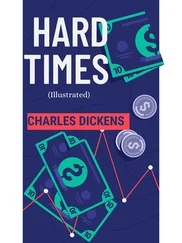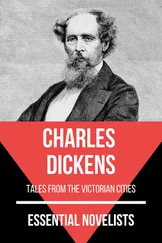The inattention and indolence of his manner were sufficiently relieved, to Mrs. Sparsit's thinking, by a certain gallantry at ease, which offered her homage too. Here he was, for instance, at this moment, all but sitting on the table, and yet lazily bending over her, as if he acknowledged an attraction in her that made her charming—in her way.
“Banks, I know, are always suspicious, and officially must be,” said the stranger, whose lightness and smoothness of speech were pleasant likewise; suggesting matter far more sensible and humorous than it ever contained—which was perhaps a shrewd device of the founder of this numerous sect, whosoever may have been that great man: “therefore I may observe that my letter—here it is—is from the member for this place—Gradgrind—whom I have had the pleasure of knowing in London.”
Mrs. Sparsit recognized the hand, intimated that such confirmation was quite unnecessary, and gave Mr. Bounderby's address, with all needful clues and directions in aid.
“Thousand thanks,” said the stranger. “Of course you know the Banker well?”
“Yes, sir,” rejoined Mrs. Sparsit. “In my dependent relation towards him, I have known him ten years.”
“Quite an eternity! I think he married Gradgrind's daughter?”
“Yes,” said Mrs. Sparsit, suddenly compressing her mouth, “he had that—honour.”
“The lady is quite a philosopher, I am told?”
“Indeed, sir,” said Mrs. Sparsit. “Is she?”
“Excuse my impertinent curiosity,” pursued the stranger, fluttering over Mrs. Sparsit's eyebrows, with a propitiatory air, “but you know the family, and know the world. I am about to know the family, and may have much to do with them. Is the lady so very alarming? Her father gives her such a portentously hard-headed reputation, that I have a burning desire to know. Is she absolutely unapproachable? Repellently and stunningly clever? I see, by your meaning smile, you think not. You have poured balm into my anxious soul. As to age, now. Forty? Five and thirty?”
Mrs. Sparsit laughed outright. “A chit,” said she. “Not twenty when she was married.”
“I give you my honour, Mrs. Powler,” returned the stranger, detaching himself from the table, “that I never was so astonished in my life!”
It really did seem to impress him, to the utmost extent of his capacity of being impressed. He looked at his informant for full a quarter of a minute, and appeared to have the surprise in his mind all the time. “I assure you, Mrs. Powler,” he then said, much exhausted, “that the father's manner prepared me for a grim and stony maturity. I am obliged to you, of all things, for correcting so absurd a mistake. Pray excuse my intrusion. Many thanks. Good day!”
He bowed himself out; and Mrs. Sparsit, hiding in the window curtain, saw him languishing down the street on the shady side of the way, observed of all the town.
“What do you think of the gentleman, Bitzer?” she asked the light porter, when he came to take away.
“Spends a deal of money on his dress, ma'am.”
“It must be admitted,” said Mrs. Sparsit, “that it's very tasteful.”
“Yes, ma'am,” returned Bitzer, “if that's worth the money.”
“Besides which, ma'am,” resumed Bitzer, while he was polishing the table, “he looks to me as if he gamed.”
“It's immoral to game,” said Mrs. Sparsit.
“It's ridiculous, ma'am,” said Bitzer, “because the chances are against the players.”
Whether it was that the heat prevented Mrs. Sparsit from working, or whether it was that her hand was out, she did no work that night. She sat at the window, when the sun began to sink behind the smoke; she sat there, when the smoke was burning red, when the colour faded from it, when darkness seemed to rise slowly out of the ground, and creep upward, upward, up to the house-tops, up the church steeple, up to the summits of the factory chimneys, up to the sky. Without a candle in the room, Mrs. Sparsit sat at the window, with her hands before her, not thinking much of the sounds of evening; the whooping of boys, the barking of dogs, the rumbling of wheels, the steps and voices of passengers, the shrill street cries, the clogs upon the pavement when it was their hour for going by, the shutting-up of shop-shutters. Not until the light porter announced that her nocturnal sweetbread was ready, did Mrs. Sparsit arouse herself from her reverie, and convey her dense black eyebrows—by that time creased with meditation, as if they needed ironing out-up-stairs.
“O, you Fool!” said Mrs. Sparsit, when she was alone at her supper. Whom she meant, she did not say; but she could scarcely have meant the sweetbread.
CHAPTER II
MR. JAMES HARTHOUSE
THE Gradgrind party wanted assistance in cutting the throats of the Graces. They went about recruiting; and where could they enlist recruits more hopefully, than among the fine gentlemen who, having found out everything to be worth nothing, were equally ready for anything?
Moreover, the healthy spirits who had mounted to this sublime height were attractive to many of the Gradgrind school. They liked fine gentlemen; they pretended that they did not, but they did. They became exhausted in imitation of them; and they yaw-yawed in their speech like them; and they served out, with an enervated air, the little mouldy rations of political economy, on which they regaled their disciples. There never before was seen on earth such a wonderful hybrid race as was thus produced.
Among the fine gentlemen not regularly belonging to the Gradgrind school, there was one of a good family and a better appearance, with a happy turn of humour which had told immensely with the House of Commons on the occasion of his entertaining it with his (and the Board of Directors) view of a railway accident, in which the most careful officers ever known, employed by the most liberal managers ever heard of, assisted by the finest mechanical contrivances ever devised, the whole in action on the best line ever constructed, had killed five people and wounded thirty-two, by a casualty without which the excellence of the whole system would have been positively incomplete. Among the slain was a cow, and among the scattered articles unowned, a widow's cap. And the honourable member had so tickled the House (which has a delicate sense of humour) by putting the cap on the cow, that it became impatient of any serious reference to the Coroner's Inquest, and brought the railway off with Cheers and Laughter.
Now, this gentleman had a younger brother of still better appearance than himself, who had tried life as a Cornet of Dragoons, and found it a bore; and had afterwards tried it in the train of an English minister abroad, and found it a bore; and had then strolled to Jerusalem, and got bored there; and had then gone yachting about the world, and got bored everywhere. To whom this honourable and jocular, member fraternally said one day, “Jem, there's a good opening among the hard Fact fellows, and they want men. I wonder you don't go in for statistics.” Jem, rather taken by the novelty of the idea, and very hard up for a change, was as ready to “go in” for statistics as for anything else. So, he went in. He coached himself up with a blue-book or two; and his brother put it about among the hard Fact fellows, and said, “If you want to bring in, for any place, a handsome dog who can make you a devilish good speech, look after my brother Jem, for he's your man.” After a few dashes in the public meeting way, Mr. Gradgrind and a council of political sages approved of Jem, and it was resolved to send him down to Coketown, to become known there and in the neighbourhood. Hence the letter Jem had last night shown to Mrs. Sparsit, which Mr. Bounderby now held in his hand; superscribed, “Josiah Bounderby, Esquire, Banker, Coketown. Specially to introduce James Harthouse, Esquire. Thomas Gradgrind.”
Читать дальше
Конец ознакомительного отрывка
Купить книгу












